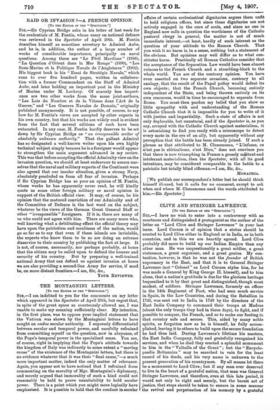RAID OR INVASION P—A FRENCH OPINION.
• [To THE EDITOR oy THE "SPECTATOR."] Cyprian Bridge asks in his letter of last week for the credentials of M. Fontin, whose essay on national defence was reviewed in the Spectator of April 20th. M. Fontin describes himself as sometime secretary to Admiral Aube, and he is, in addition, the author of a large number of works of considerable importance, principally on naval questions. Among these are "Le Peril Maritime" (1888), "La Question d'Orient dana la Mer Rouge" (1890), "Lee Sous-Marina et la Politique Navale de l'Angleterre " (1902). His biggest book is his " ESSai de Strategic) Navale," which runs to over five hundred pages, written in collabora- tion with a former Commandant on the Staff of Admiral .Aube, and later holding an important post in the Ministry of Marine under M. Lockroy. Of scarcely less import- ance are two other works from the same joint-authors, "Les Lois du Nombre et de la Vitesse dans l'Art de la Guerre," and "Lea Guerres Navales de Domain," originally published anonymously. It is not possible, of course, to say how far M. Fontin's views are accepted by other experts in his own country, but that his works are widely read is evident from the fact that several editions of each have been exhausted. In any case, M. Fontin hardly deserves to be set down by Sir Cyprian Bridge as "an irresponsible writer of absolutely unknown authority." That the gallant Admiral has so designated a well-known writer upon his own highly technical subject simply because he is a foreigner would appear to strengthen the main argument advanced in my review. This was that before accepting the official Admiralty view on the invasion question, we should at least endeavour to assure our- selves that the naval and military experts of the Continent were also agreed that our insular situation, given a strong Navy, absolutely precluded us from all fear of invasion. Perhaps if Sir Cyprian Bridge has so poor an opinion of M. Fontin, whose works he has apparently never read, he will kindly quote us some other foreign military or naval opinion in support of the British official view. It may, of course, be his opinion that the matured conviction of our Admiralty and of the Committee of Defence is the last word on the subject, whatever be the views Of the German Great General Staff or other " irresponsible " foreigners. If it is, there are many of us who could not agree with him. There are many more who, well knowing what a debilitating effect the official theory may have upon the patriotism and manliness of the nation, would go so far as to say that even if these islands are inviolable, the experts who know them to be so are doing an extreme disservice to their country by publishing the fact at large. It is not, of course, necessarily, nor perhaps probably, at home that the citizen may be called upon to defend the honour and security of his country. But by preparing a' well-trained national Army that can defend us against invasion at home we are also providing a second-line Army for service, if need be, on more distant frontiers.—I am, Sir, &c.,














































 Previous page
Previous page